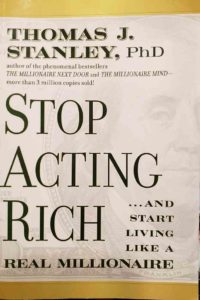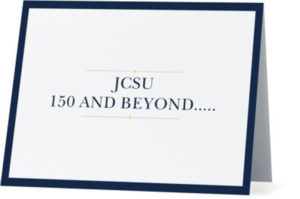
A Visit From Our School President
This piece was originally published on Dr. Matthew Lynch’s online publication The Edvocate back in May of 2015. It was entitled, Thoughts on Why HBCUs could use more Alumni than Graduates, and Financial Literacy. I decided to republish this story after the new President of my alma mater, Johnson C. Smith University (JCSU), recently visited our Washington DC alumni chapter to discuss his vision for the university which is currently on probation due to financial distress.
Paltry Alumni Giving And Its Effect On Corporate Giving
A lack of alumni giving has long been a major issue for Historically Black Colleges and Universities (HBCUs). Something our new President Clarence Armbrister shared with us that I didn’t know, was that securing funding from Corporate America is difficult if alumni aren’t already giving significantly. Donors in fact inquire about alumni giving when deciding to give money themselves confounding the problem.
What’s at the heart of this conundrum? I think a major piece is that the concepts of wealth-building aren’t passed on in the ecosystems many HBCU students come from. When I say ‘ecosystems’ in this context, I’m referring to the environment the students have come from prior to matriculating into their particular schools – their home, their social circles, their church and the school systems they’ve come from – in some instances where the goal is simply survival.
The Importance Of Alumni Giving
Coincidentally when you start studying money, a common theme you see is the importance of giving. Since many of these students are not receiving this information from wherever they come from, perhaps our HBCUs should consider planting these seeds in their student’s minds before they graduate – weaving it into their curricula somehow. After all, higher education is actually a business, and it isn’t free as someone somewhere has to pay for it.
In a previous post regarding the Tax Reform and Jobs Act, I discussed my alma mater being on probation, and challenged other HBCU alums to take some of the money they’ve received from their tax break and pass it on to their alma maters – something which may have upset some readers. In this piece, I suggest that the HBCUs themselves should proactively arm their students with information which will not only empower them during their working lives, but also compel them to give support back to the places which gave them their start, allowing other kids to have similar opportunities.
A Lack Of Alumni Giving
Being highly involved in the Washington DC Alumni Chapter for Johnson C. Smith University (JCSU), I’ve become keenly aware of the issues facing HBCUs. As an education advocate and writer, I’ve helped promote the “Quotes for Education” collaboration between Allstate and the Tom Joyner Foundation the last two years. In numerous interviews with Allstate’s Senior Vice-President and Florida A&M University alumnus Cheryl Harris, the importance of HBCU alumni giving back to their alma maters was stressed. In addition to the other pressures these institutions are facing, one of the more significant problems is the lack of alumni giving.
At a recent Executive Board meeting, our Chapter President Robert Ridley shared with us an idea he read stating that, “A graduate is someone who gets a degree from an institution and never looks back. An alumnus is someone who gives their time and money back to their alma mater!” This was an important distinction that I’d never heard before, not even when I was a student at JCSU. It’s an important concept that arguably should be introduced from day one at our HBCUs.
Giving Future Generations A Fighting Chance
Why is it important for graduates to give back to their alma maters? The main reason is to give future generations a fighting chance to succeed. This is particularly important for Black America. Secondly, institutions of higher learning rely on state, federal and extramural funding from private donors. Many HBCU’s are “Land Grant” institutions and their funding has been decreased ironically under the Obama Administration, in addition to the tightening of the borrowing criteria for the “Parent Plus Loans” which many HBCU students and families heavily relied upon. Thus donations from alumni have become more important.
As unofficially told by an insider, for the 2014 fiscal year, less than 14% of my class of 1999 gave anything back to JCSU, a staggeringly low number. When our school President Dr. Ronald Carter gave an overview of the current health of the University here in Washington, DC, he cited low alumni giving as one potential threat to the University’s future. A key piece of that evening was encouraging alumni to consider cutting back on certain luxuries to free up money to give back.

Why Don’t HBCU Alumni Give Back In Greater Numbers?
Why don’t HBCU Alums give more to their alma maters? Why would only 14% of my class give back to the University? One reason is that many students who’ve attended HBCUs feel as though they’ve given enough of their money to their alma mater when pursuing their educations, and don’t feel inclined to give anything else after graduating. Another reason is hard feelings towards one’s alma mater. Many graduates feel bitter about their experience for one reason or the other as well. I’ve heard this personally and read about it in other articles.
Another piece to this puzzle though is socioeconomic. Of the many curses to being born black in the United States, a key one is starting from lower rungs on the economic ladder than our counterparts of other ethnicities. If for example, your parents planned ahead and saved a college fund for you, your economic burden will likely be lessened or non-existent upon graduation as discussed by Georgette Miller, Esq. in Living Debt Free. You’ll have less debt and more disposable income (some to donate) once starting your career.
“They just weren’t thinking that way,” my father said in a discussion about my grandparents in a discussion about mortgages. I stumbled upon the basics of financial literacy by accident (from books like Rich Dad Poor Dad and The Millionaire Next Door), and wondered why my parents didn’t teach me more about the vital knowledge shared in these books. They didn’t know themselves and I think this is true for a lot of African American families in the United States.
Low Levels Of Financial Literacy
Likewise, I hypothesize that many other college graduates from my community have a low level of financial literacy and that in part drives this lack of giving that we see from alumni towards their HBCUs. In other words, they know how to lavishly spend it, but not how to gradually save and grow it. If my hypothesis is true and many students are matriculating into our HBCUs with low levels of financial literacy, HBCU’s may do good to start educating their students on these topics from day one and also stressing that higher education is in fact a business. A good place to start would be Dave Ramsey’s Financial Peace University (FPU), or something similar.
I honestly didn’t seriously start giving to either of my alma maters until going through the FPU class taught at my church. In FPU, I learned that the greatest misunderstanding about money is that one of major keys to building and maintaining wealth is blessing others. Put another way, sustained financial health and giving are a function of one another, and in order for one to be able to give, one’s own financial house must first be in order.
Student loan debt can also help explain the lack of giving, but my suspicion is that there’s a percentage of graduates that once they get established, their finances aren’t situated so that they’re able to give back, or giving back just isn’t a priority. Coming from the African American community, there is truth to the myth that we as a community often collectively make poor financial decisions, particularly when ‘keeping up with the Joneses’, ‘signaling’, and trying to portray a certain image. For this reason, and because so many of us don’t get it at home, HBCUs once again may do good to expose their students to a financial literacy curricula such as FPU which ultimately stresses sound financial decision making and ultimately charitable giving.
Why Give Back?
So why give back? Giving back to our alma maters, especially HBCUs is important if we want to see future generations grow and thrive. One of the keys to advancement of the African American community in the United States is financial stability as a group. Likewise the community itself has a responsibility to give its younger generations a fighting chance to participate in our new global economy. In the United States, economic power influences everything else. Regarding my own graduating class of 1999, we can do better than a 14% rate of participation in terms of giving back to our alma mater, as can graduates from other institutions.
Thank you for taking the time to read this blog post. In you enjoyed this post you might also enjoy:
• What are your plans for your tax cut? Thought on what can be done with heavier paychecks and paying tax
• Who will have the skills to benefit from Apple’s $350 investment?
• Challenging stereotypes and misconceptions on household income and wealth building
• We should’ve bought Facebook and Bitcoin stock: An investing story
• Your net worth, your gross salary and what they mean
• The difference between being cheap and frugal
If you’ve found value here and think it would benefit others, please share it and or leave a comment. To receive all of the most up to date content from the Big Words Blog Site, subscribe using the subscription box in the right-hand column in this post and throughout the site. Please visit my YouTube channel entitled, Big Discussions76. Lastly follow me on the Big Words Blog Site Facebook page, Twitter at @BWArePowerful, and on Instagram at @anwaryusef76. While my main areas of focus are Education, STEM and Financial Literacy, there are other blogs/sites I endorse which can be found on that particular page of my site.

 One of the focuses of the Big Words Blog Site is Education – all aspects. Higher education is not just a means to a career and upward mobility, but it’s also a business with both benefits and costs to the student, parents, the institution, and society. Likewise, one of the major concerns of parents and students, in addition to getting into a school, is actually financing the college tuition, room and board. The amount of money awarded students was, in fact, one of the major discussion points recently at the
One of the focuses of the Big Words Blog Site is Education – all aspects. Higher education is not just a means to a career and upward mobility, but it’s also a business with both benefits and costs to the student, parents, the institution, and society. Likewise, one of the major concerns of parents and students, in addition to getting into a school, is actually financing the college tuition, room and board. The amount of money awarded students was, in fact, one of the major discussion points recently at the